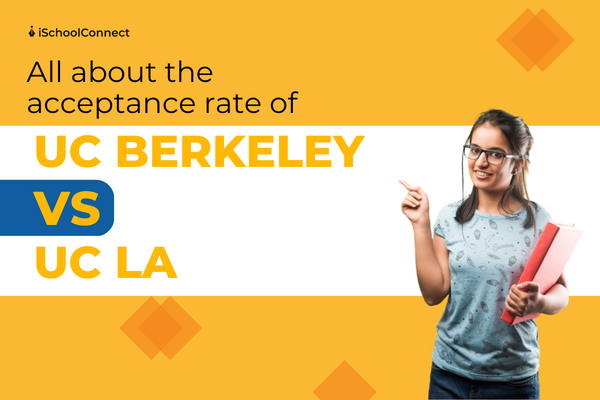Table of Contents
UC Berkeley vs. UCLA | All you need to know!
According to the QS World University Rankings 2022, UC Berkeley and UCLA are both among the top 50 universities in the world. But, which is superior, UC Berkeley vs. UCLA? This query is frequently asked by international students as they prepare to study abroad. Learn which option provides international students with a better experience, exposure, and return on investment by reading this article.
UC Berkeley vs. UCLA | Departments and courses
UC Berkeley
At UC Berkeley, there are 5 academic colleges and 1 school. There are 150 undergraduate majors and minors available to students at these colleges as a whole.
- Chemistry College
- Haas School of Business
- College of Engineering
- Division of Computing, Data Science & Society
- Graduate School of Education
- College of Environmental Design
- School of Information
- Graduate School of Journalism
- School of Law
- College of Letters & Science
- Rausser College of Natural Resources
- School of Optometry
- School of Public Health
- Richard and Rhoda Goldman School of Public Policy
- School of Social Welfare
UCLA
There are 130 undergraduate majors available at UCLA, which has 7 academic divisions.
- School of Arts and Architecture
- The College
- School of Dentistry
- School of Education and Information Studies
- The Samueli School of Engineering
- School of Law
- Anderson School of Management
- David Geffen School of Medicine
- Herb Alpert School of Music
- Nursing School
- Luskin School of Public Affairs
- Fielding School of Public Health
- School of Theatre, Film and Television
Application requirements
High GPAs, SAT scores, and ACT scores are requirements for both universities.
| U.C. Berkeley | UCLA |
| You must have a GPA of 4.15 to attend UC Berkeley. | UCLA is quite selective and only accepts applicants with a GPA of 4.18 or higher. |
| The typical SAT score ranges from 1415 to 1600. | Not required, will only be needed in case you are unable to fulfill the minimum criteria |
| You must have an average ACT score of 31. | Not required, will only be needed in case you are unable to fulfill the minimum criteria |
Cost of education
The cost of attending UC Berkeley and UCLA is shown in the table below as a yearly average. This includes tuition and college costs as well as the price of books, housing costs, etc. –
| Expense | U.C. Berkeley | UCLA |
| Tuition and fees | $50,001 | $47,052 |
| Books & supplies | $1,091 | $1,574 |
| Accommodation | On-campus- $20,530 Off-campus- $15,241 | On-campus- $17,148 Off-campus- $17,436 |
UC Berkeley vs. UCLA | Acceptance rate
With a total of 196,932 applicants and 30,992 enrolled students, the average acceptance rate for the two competing colleges, UC Berkeley and UCLA, is 14.4% and 8.6% respectively, while the enrollment rate (also known as the admission rate) is 40.34%.
- With a 14.33% passing percentage, UCLA is the hardest institution to get into.
- With a passing rate of 17.48%, UC Berkeley is second-to-last.
Important dates and application process

There are several similarities between the admission processes for UC Berkeley vs. UCLA. For some courses, there are various due dates. Let’s look at both universities’ thorough application procedures.
U.C. Berkeley
- Application available as of August 1
- October 1: Submit the FAFSA and CA Dream Act financial aid applications.
- November 1 to November 30: Application Period
- The deadline for applications is November 30.
- Early in December, UCB notifies applicants that their applications have been received.
- The deadline for UCB forms is January 31.
- March 31st: Freshman Decision End of April posting: Transfer Decision Posted
- The first-year student admittance deadline is May 1.
- The deadline for transfer students to accept an offer is June 1.
UCLA
- Application for UCLA opens on August 1
- Beginning on October 1, all candidates must submit free Federal Student Aid (FAFSA) and Dream Law applications. The registration deadline for the GPA verification form is reached (required only if California residents are considering a Cal Grant).
- November 1 to November 30: Application Period
- The Financial Aid Application (FAFSA), the Cal Grant GPA Verification Form, and the Dream Act all have due dates of March 2.
- End of March: Notification of admission
- May 1 is the deadline for applying for campus housing, paying the entrance deposit, and joining the UCLA College Honors Program.
- Submit the last round of formal admission requirements by July 1. Must be electronically submitted or mailed no later than July 1.
- IB and AP Exam official results are communicated to admissions on July 15. All test results must be electronically submitted or postmarked by July 15.
Required documents
The same documents are needed to apply for undergraduate and graduate programs at both universities. The list of documents accepted by UC Berkeley vs. UCLA is provided below.
| U.C. Berkeley | UCLA |
| A four-year bachelor’s degree from an approved institution, at least as good as a bachelor’s degree from the University of California, plus a high school diploma and transcripts. | A high school diploma, a degree that is comparable to a bachelor’s degree in the United States, or 15 years of academic study with a 3.4 GPA in English. |
| The overall grade point average must be at least B (3.0 on a 5.0 scale). | Medical records |
| You can demonstrate your proficiency in the English language by submitting the following scores: 7.0 IELTS; 87 TOEFL (iBT). | Letters of Recommendation |
| GMAT/GRE scores | Insurance |
| Statement of Purpose | GMAT |
| Curriculum Vitae | GRE Subject Test |
| GRE general or MCAT scores of at least 3.0 on a 4.0 scale are required for PG courses. |
UC Berkeley vs. UCLA | Campus life

UC Berkeley
The campus of UC Berkeley is situated in Berkeley, California’s urban area. For its students, this university offers both an online course program and a study abroad program. Other amenities available on the UCB campus include:
- Military and Veteran Services, the Disability Services Site
- Daycare on-campus
- Part-time and full-time courses
- Dorm and On-campus Housing
UCLA
The urban Los Angeles area is where the UCLA campus is situated. The following UCLA programs are available to students to support learning and overall well-being.
- Veterans Resource Center is one of the amenities (VRC)
- Center for LGBTQ Resources
- Parent & Family Organization of UCLA
- Relations between fraternities and sororities (FSL)
- Student Organizations, Engagement, and Leadership
- Possibilities for sponsorship
Key takeaways
- UC Berkeley and UCLA are both excellent universities with unique strengths and differences. When it comes to deciding between the two, it ultimately depends on your personal preferences and goals.
- Both UC Berkeley and UCLA offer a wide range of majors, but some programs are stronger at one university than the other. Research the departments you are interested in and see which school offers the better program.
- UC Berkeley and UCLA have different campus cultures and student populations. UC Berkeley is known for its politically active and socially aware student body, while UCLA has a more laid-back vibe.
- Both schools are public universities, but the cost of attending can vary depending on factors such as financial aid and out-of-state residency.
We hope you enjoyed reading this blog. In case of any queries, or if choosing between UC Berkeley vs. UCLA still leaves you confused, you can always get in touch with us. You may rely on our professional to assist you in finding the solution you’re looking for!
Liked this blog? Then read: Here are the top 100 universities in the world!
FAQ
Q1. Can I submit applications to two or more UCLA graduate programs?
Answer- No. Only students with established concurrent or articulated degrees are exempt from the university’s requirement that all applicants apply for a single major.
Q2. Does the UCB provide its students with a waiver of the application fee?
Answer- Yes. Only students who can prove they need financial aid and who are U.S. citizens or permanent residents are qualified for an application fee waiver.
Q3. How much time will it take me to finish my Ph.D. or M.S. at UCLA?
Answer- An M.S. degree typically requires five quarters to finish, compared to a Ph.D. student’s six years on average.







